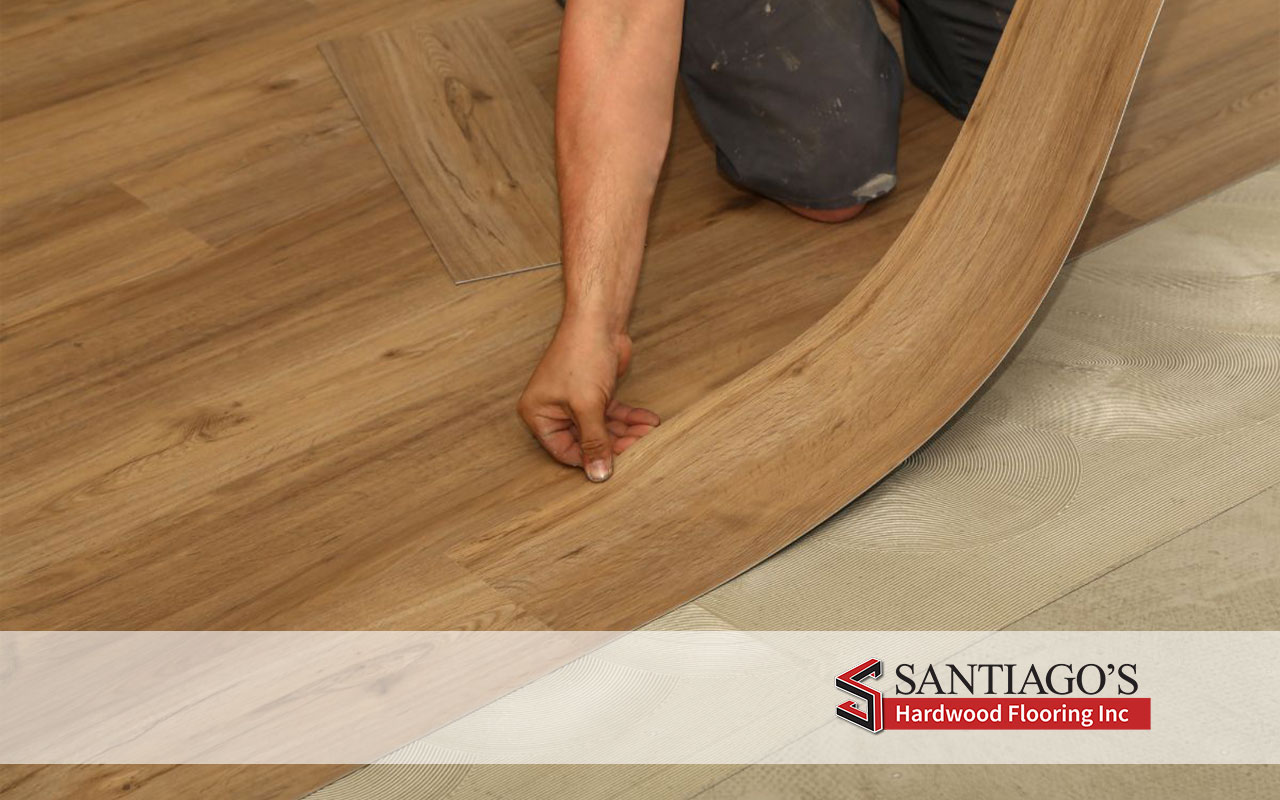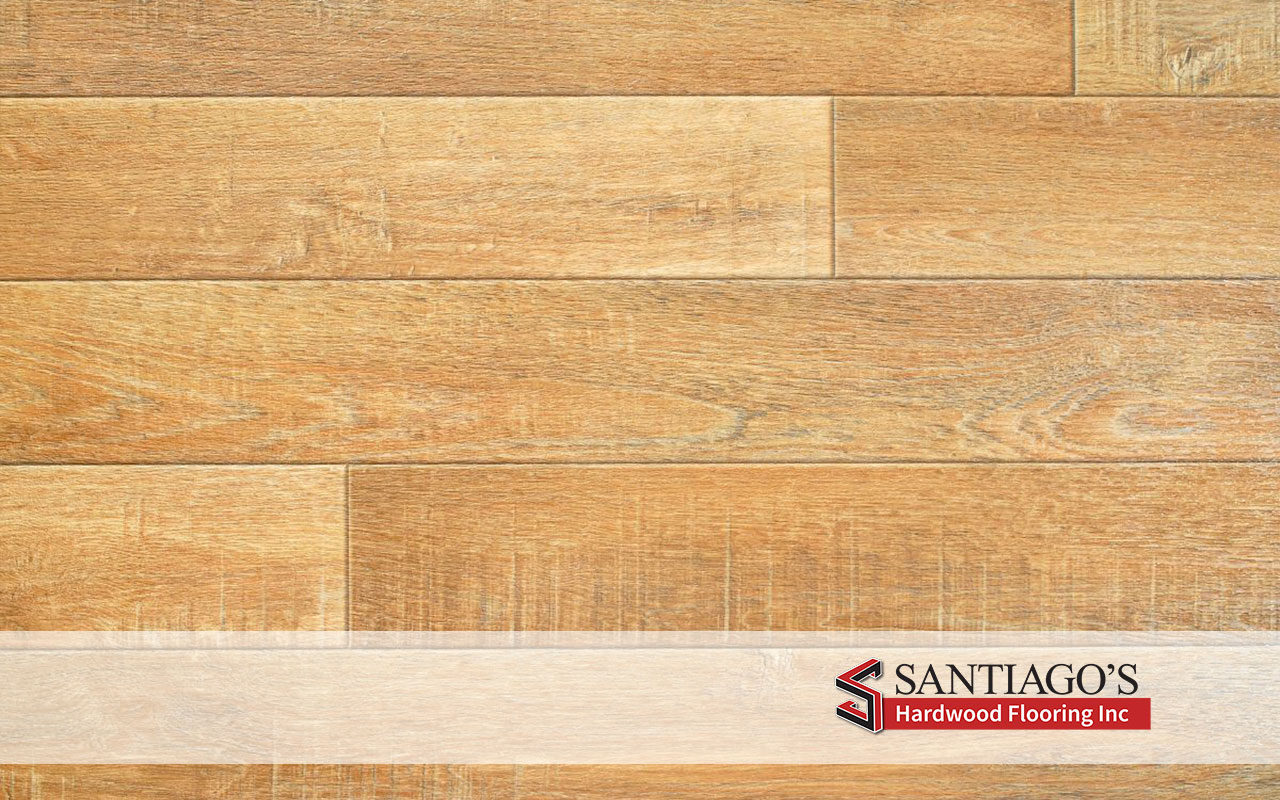
In this Article:
Expansion Characteristics of Vinyl Flooring
The Dynamics of Vinyl Flooring Expansion
Practical Tips and Facts About Vinyl Flooring Expansion
Trust Santiago’s Hardwood Flooring Inc. for Your Flooring Needs
Homeowners often have the question: does vinyl flooring expand? Vinyl’s popularity stems from its affordability and practicality, yet its expansion under varying climates is a crucial consideration. This article unveils how temperature and humidity may cause vinyl to swell and shrink, impacting your flooring investment’s longevity and aesthetics. We will decode the expansion characteristics of vinyl to help you make informed decisions for installation and care.
Expansion Characteristics of Vinyl Flooring
Vinyl flooring is a marvel of modern engineering, designed to withstand a great deal of what daily life throws its way. But despite its durability and versatile design, many homeowners question, “Does vinyl flooring expand?” It’s a pertinent question that affects everything from installation to long-term maintenance.
In this section, we’ll tackle the fundamental principles that govern the expansion and contraction of vinyl flooring. Understanding these principles is essential for anyone looking to maintain their flooring in pristine condition, as environmental factors play a significant role in the behavior of vinyl materials.
The Dynamics of Vinyl Flooring Expansion

Vinyl flooring, known for its resilience and aesthetic appeal, is subject to expansion and contraction for various reasons. Understanding these factors can help adequately install and maintain your flooring. Below are the bullet-pointed reasons and causes that influence vinyl flooring’s dimensional changes:
Temperature Fluctuations:
- Vinyl is a type of plastic that reacts to temperature changes like most plastics. It tends to expand in warmer temperatures and contract when it cools down.
- Sun exposure can heat the floor’s surface significantly, leading to more pronounced expansion.
Humidity Levels:
- High humidity can introduce moisture to vinyl plank flooring, causing it to expand. Conversely, low humidity levels can make the planks shrink.
- Proper acclimation of the flooring to the room environment can mitigate this issue.
Quality of Installation:
- Incorrect installation without proper expansion gaps can restrict the natural movement of vinyl planks, leading to buckling.
- Floating vinyl floors, which are not glued or nailed down, may expand more quickly if not installed with sufficient space around the edges.
Subfloor Conditions:
- Moisture from the subfloor can affect vinyl flooring. A damp subfloor can cause expansion and possible damage to the vinyl above.
- Using a moisture barrier or underlayment can help prevent this problem.
Manufacturing Quality:
- Lower-quality vinyl flooring may be less stable and can exhibit more significant expansion and contraction.
- It is vital to choose high-quality vinyl to ensure dimensional stability.
Room Traffic:
- Heavy furniture and appliances can pressure vinyl flooring, affecting its ability to expand and contract naturally.
Acclimation Period:
- Not allowing a new vinyl floor to acclimate to its environment before installation can lead to expansion or contraction post-installation.
Cleaning Practices:
- Excessive water during cleaning can seep between and beneath planks, causing material swelling.
By addressing these factors, homeowners can ensure their vinyl flooring remains beautiful and stable for years. Proper understanding and preventative measures can make all the difference in the performance and lifespan of your vinyl floors.
Practical Tips and Facts About Vinyl Flooring Expansion

Knowing that vinyl flooring can expand, there are several tips and facts that homeowners should keep in mind to prevent and address potential issues:
Tips:
- Always leave the recommended gap for expansion when installing vinyl flooring to accommodate any changes.
- When purchasing vinyl flooring, ask about the product’s coefficient of linear thermal expansion to understand how it behaves with temperature changes.
- Consider the room’s usual temperature and sunlight exposure before choosing your vinyl for areas with significant temperature swings.
- Use proper cleaning methods—avoid excess water, and use cleaners that are designed for vinyl flooring.
Facts:
- The thickness of the vinyl flooring does not necessarily correlate with its potential for expansion.
- Not all vinyl flooring is created equal. The composition differs across types, which affects the rate and amount of expansion you can expect.
- Vinyl plank flooring typically requires an acclimation period of 48 hours in the room where it will be installed.
Questions
Is there a difference in expansion between luxury vinyl planks (LVP) and vinyl sheet flooring?
Yes, LVP and vinyl sheets may respond differently to environmental conditions due to their distinct installation methods and material composition.
How do you fix vinyl flooring that has expanded and buckled?
Sometimes, simply removing the trim and cutting a sliver off the edge of the planks can provide the needed room for expansion.
By considering these tips and facts, you can better manage the expansion characteristics of vinyl flooring and ensure a long-lasting, beautiful floor. Always consult a professional if you need clarification on the steps to take for your specific flooring situation.
Trust Santiago’s Hardwood Flooring Inc. for Your Flooring Needs
At Santiago’s Hardwood Flooring Inc., we understand the intricacies of vinyl flooring expansion and are equipped to handle all your flooring requirements with precision and care. Our team of experts ensures that every installation accounts for potential environmental effects, delivering a finish that stands the test of time. With our professional services, you can rest assured that your vinyl flooring will be a lasting investment in your home’s beauty and comfort.
Contact Santiago’s Hardwood Flooring Inc. Let us help you create an elegant and practical space with the peace of mind of knowing your floors are in the hands of seasoned professionals.
